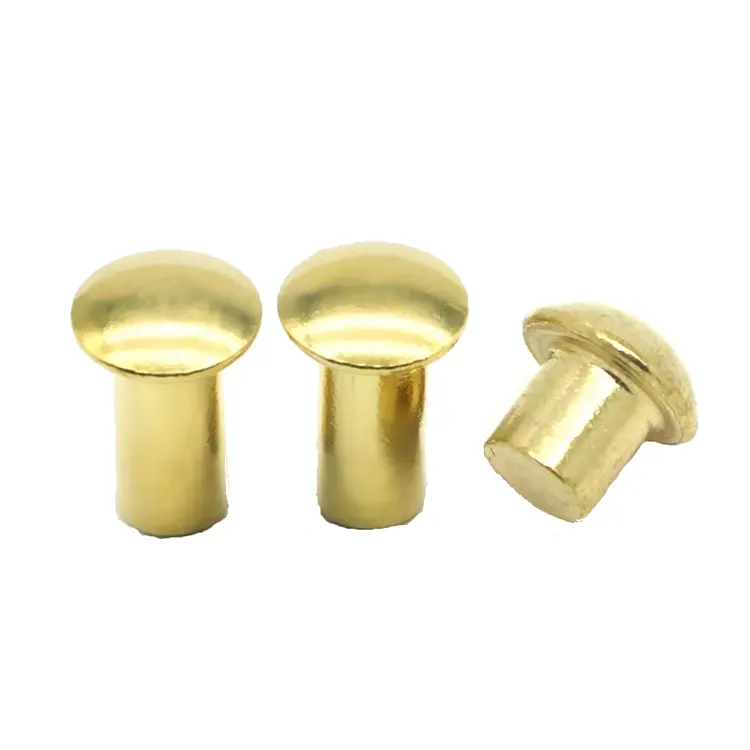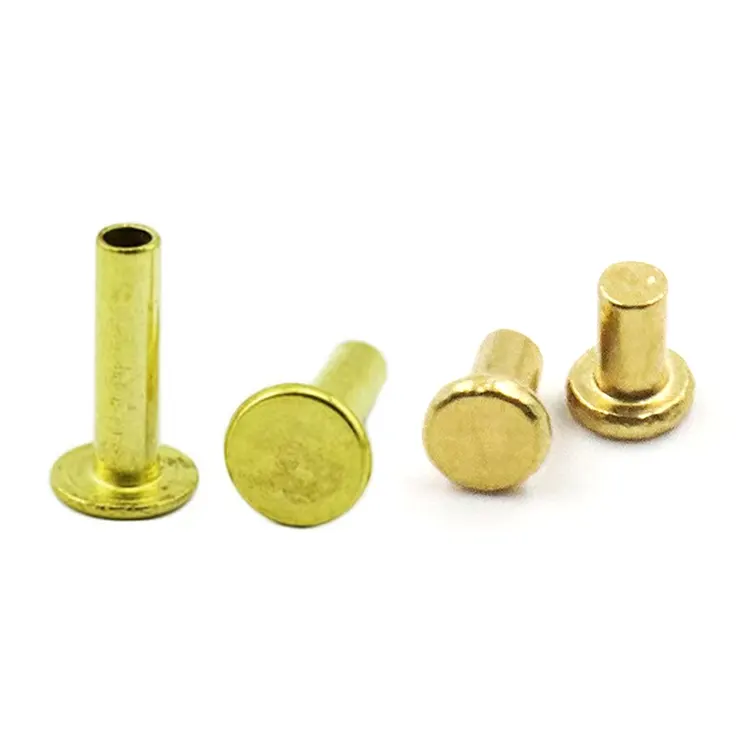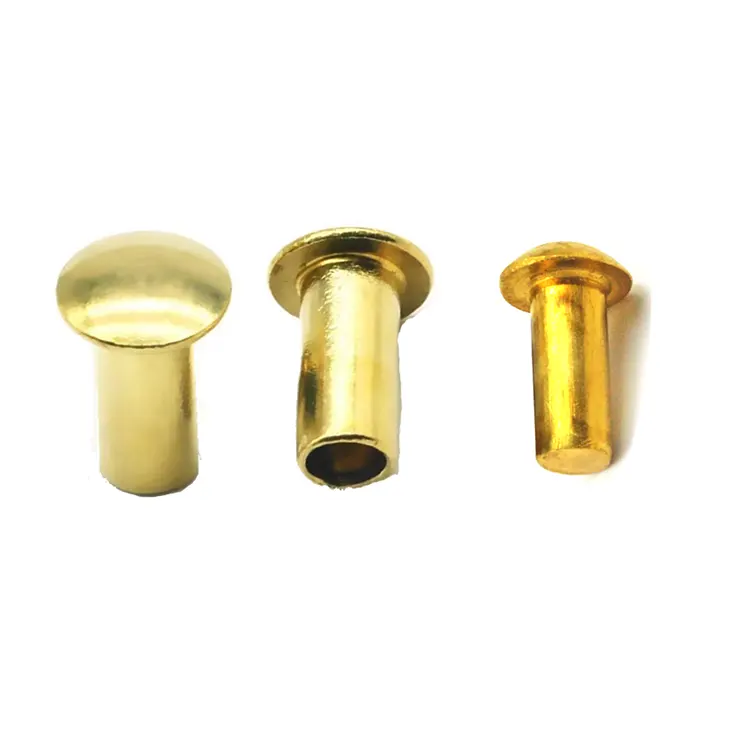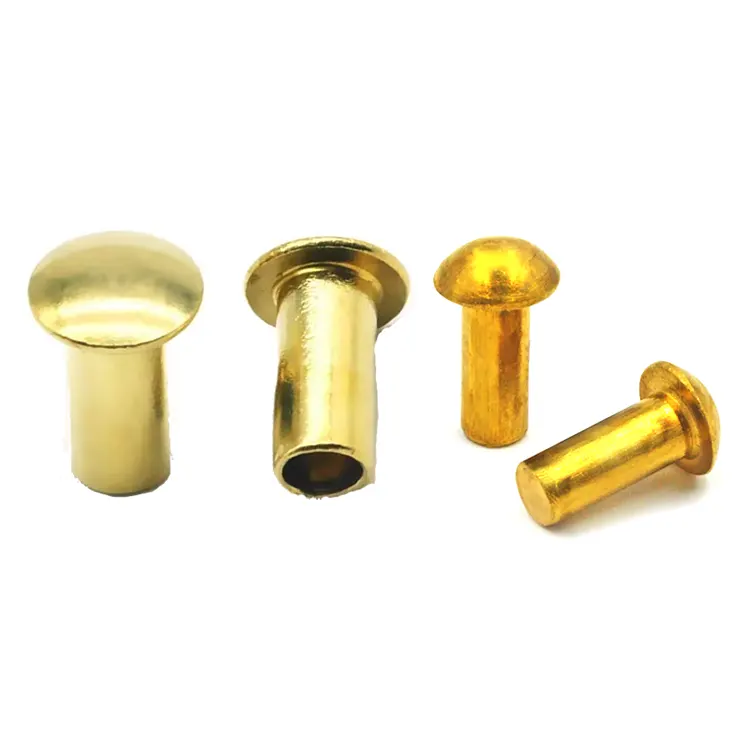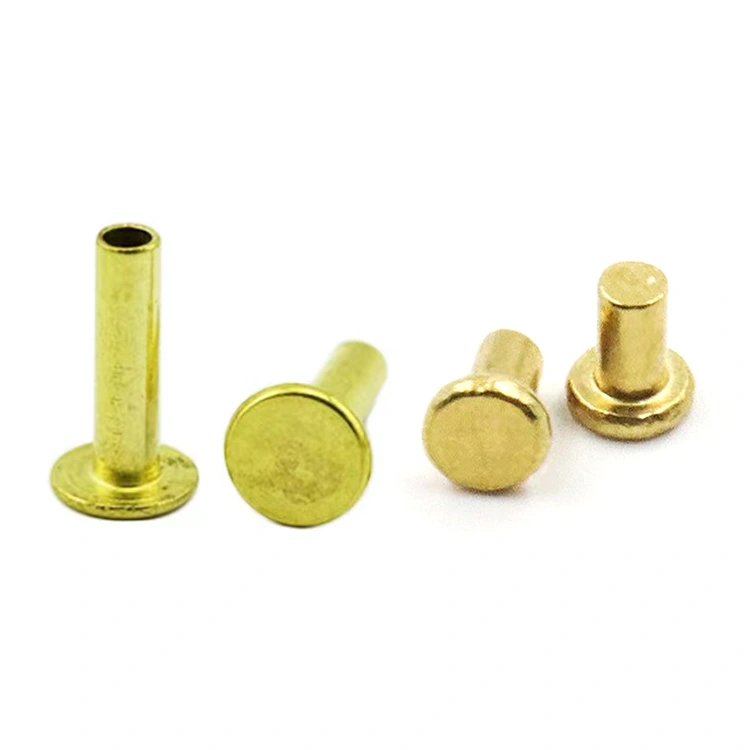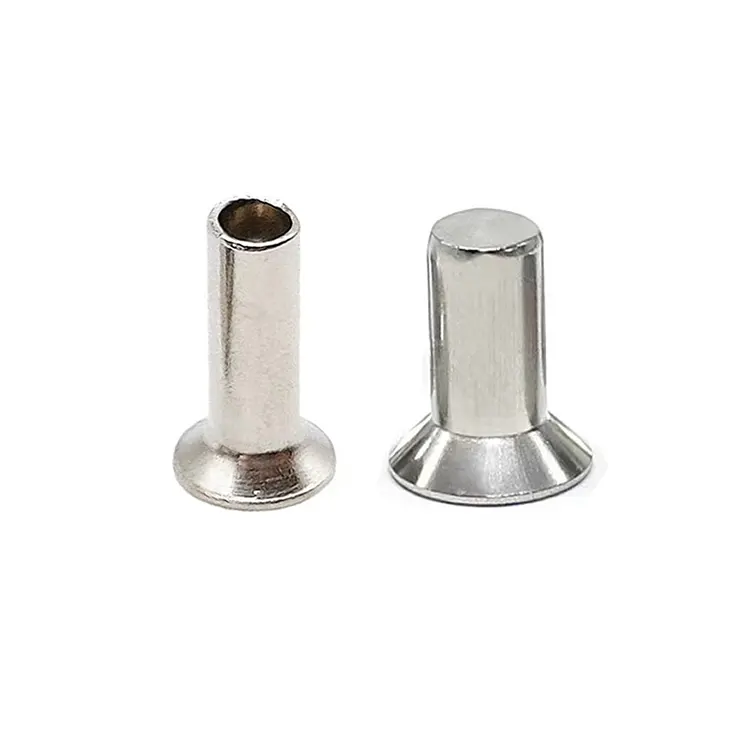Nitter
As one of professional manufacturer in China, Notin would like to provide you Rivets. And we will offer you the best after-sale service and timely delivery.
What is a rivet?
A rivet is a permanent mechanical fastener used to join two or more materials. Rivets work by inserting a metal pin into an aligned hole and deforming the end, creating a strong, secure, and durable connection. Unlike temporary fasteners like screws, rivets do not rely on threads, but instead form a permanent connection, making them ideal for applications requiring high strength, durability, and vibration resistance.
Classification of Rivets
Rivets are typically categorized by head shape, degree of hollowness, or material.
Based on head shape, rivets can be classified as flat head rivets, round head rivets, countersunk head rivets, mushroom head rivets, universal head rivets, truss head rivets, etc.

Based on degree of hollowness, rivets can be classified as solid rivets, semi-tubular rivets, or full tubular rivets.
Based on material, rivets can be classified as brass rivets, stainless steel rivets, steel rivets, aluminum rivets, copper rivets, etc.
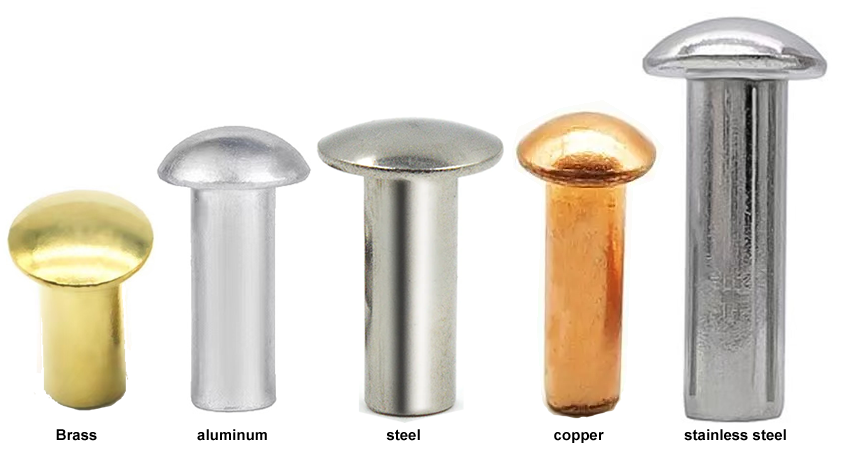
What surface finishes are available for rivets?
Rivet surfaces are typically treated with rust-proofing treatments, primarily electroplating, including zinc plating, nickel plating, chrome plating, tin plating, gold plating, and silver plating. Electroplating is a common rust-proofing method for rivets. It applies a layer of plating to the rivet surface through physical or chemical methods. The plating effectively prevents corrosion and rust, while also providing a certain aesthetic effect.
Another special surface treatment method is head coating. Head coating is performed after the rivet is electroplated. This allows for a variety of colors on the rivet head, achieving an aesthetically pleasing finish.
Aluminum rivets cannot be electroplated, but they can be anodized. Anodizing also allows for a variety of color options, but the unit price is higher than electroplating.
Rust-proofing the rivet surface is crucial, effectively extending the rivet's service life and ensuring a secure connection. Different rust-proofing methods are suitable for different environments and applications, so the choice should be tailored to the specific situation.
- View as
Nitter med rund hoved af messing
Nuote Metals har specialiseret sig i produktion og salg af rundnitter af messing. Vi er beliggende i Dongguan, Kina, en by med en stærk industriel udvikling. Vores semi-bulgy hovednitter af kobber består af et skaft og en hætte lavet af messinglegering. Det semi-bulgy hoveddesign giver ensartet trykfordeling, hvilket forhindrer beskadigelse af ledoverfladen. De er kendetegnet ved deres kombinerede elektriske ledningsevne og korrosionsbestandighed, enkle konstruktion, nemme installation, høje pålidelighed og lange levetid.
Læs mereSend forespørgselMessing nitter
Nuote Metals producerer messingnitter i Kina, messingnitter er primært lavet af en kobber- og zinklegering, et materiale, der giver en række fordele. Messing' fremragende korrosionsbestandighed gør det muligt for den at modstå langtidsbrug i fugtige omgivelser uden at ruste, hvilket gør den velegnet til udendørs brug eller i forhold med høj luftfugtighed. Messing besidder også styrke og hårdhed, hvilket gør det muligt at modstå mekanisk belastning, samtidig med at den bevarer god sejhed og modstår brud. Messing har også fremragende elektrisk og termisk ledningsevne, hvilket gør den velegnet til brug i elektronisk og termisk udstyr. Messing' glatte overflade giver mulighed for nem galvanisering eller polering, hvilket forbedrer dens æstetik. Disse egenskaber gør messingnitter til et foretrukket valg på tværs af mange industrier.
Læs mereSend forespørgselPanhovednitter af messing
Nuote Metals har specialiseret sig i produktionen af nitter til panserhoveder af messing. Vores nitter er lavet af H65-messing, som har et højt messingindhold, er blødt og let at formes og er mindre tilbøjeligt til at revne under nitningsprocessen. Nitter i messing består af et hoved og et skaft, hvor skaftet er hult i cirka halvdelen af sin længde. Under installationen indsættes nitten i et forboret hul. Ved hjælp af en specialiseret nittemaskine og stempel udvider enden af skaftet sig og danner hovedet på den anden side, hvilket skaber en klemforbindelse. Denne proces er afhængig af plastisk deformation af metallet, hvilket eliminerer behovet for svejsning eller klæbemidler, hvilket gør det enkelt og effektivt.
Læs mereSend forespørgselNitter til svampehoved af messing
Messing svampehovednitter består af et hoved og en krop. Hovedet er rundt og let fladt, der ligner en svampehue. Kroppen er semi-hul, hvilket betyder, at den har et hul i midten, men går ikke helt igennem. Disse kaldes messing semi-hule svampehovednitter. Nogle nitter har en solid krop, kaldet messing solide svampehovednitter. Under installationen bruges et specialiseret værktøj til at indsætte kroppen i det forborede hul. Der påføres tryk for at deformere kroppen, hvilket får den til at udvide sig og gribe fat i materialet, hvilket skaber en sikker forbindelse. Nuote Metals har specialiseret sig i at producere disse messing svampehovednitter.
Læs mereSend forespørgselFladhovednitter af messing
Messing fladhovednitter er metalstænger med en hætte i den ene ende. De opnår nitning gennem deformation eller interferenspasning og er en almindelig fastgørelsesanordning. Det flade hoveddesign reducerer overfladefremspring, hvilket gør det velegnet til applikationer, der kræver høj planhed. Korrosionsbestandigheden af messing sikrer forbindelsesstabilitet selv i fugtige og korrosive miljøer. Nuote Metals er specialiseret i produktion af nitter med fladt hoved af messing. Vi har tusindvis af forme og kan producere en række forskellige nittespecifikationer. Vi understøtter også brugerdefinerede designs og prøver.
Læs mereSend forespørgselMessing forsænkede hovednitter
Forsænkede hovednitter af messing består primært af et hoved og et skaft. Det forsænkede hoved muliggør installation i plan med arbejdsemnets overflade, hvilket eliminerer fremspring, der kan påvirke udseende eller funktion. Det semi-hule skaft deformeres under nitningsprocessen og opnår en forbindelse. Dette design forbedrer ikke kun installationseffektiviteten, men forbedrer også forbindelsens pålidelighed. Nuote Metals har specialiseret sig i fremstilling af nitter med forsænket hoved af messing, med høj præcision og en glat, ridsefri overflade. Vi byder venner fra hele verden velkommen til at besøge vores virksomhed og samarbejde med os.
Læs mereSend forespørgselWhat are the advantages of rivets over other fasteners?
1. Ease of Installation
Rivets are fast to install, and even fully automated for high-volume applications, resulting in a simple and efficient operation process.
2. Connection Reliability
The riveting process is standardized, with strict quality control, resulting in highly stable connections. Visual inspection allows for quick verification of connection quality.
3. Vibration and Impact Resistance
Rivets connect through deformation or interference fit, providing strong clamping force and excellent vibration resistance, capable of withstanding vibration and shock.
4. Low Cost
Rivets are easy to install and can be fully automated, saving significant labor costs.
What are the advantages and disadvantages of rivets made of different materials?
Aluminum Rivets
Advantages: Lightweight, reduces overall product weight, low cost, suitable for general civilian applications.
Disadvantages: Low tensile and shear strength, unsuitable for high-strength workpieces, prone to electrochemical corrosion when in contact with metals such as stainless steel.
Stainless Steel Rivets
Advantages: Strong corrosion resistance, high hardness, suitable for high-strength workpieces (such as marine equipment)
Disadvantages: Higher cost, typically more expensive than aluminum rivets of the same specification.
Brass and Copper Rivets
Advantages: Excellent conductivity (such as connecting electronic components), good corrosion resistance.
Disadvantages: Higher cost, more difficult to process.
Steel Rivets
Advantages: High hardness, high connection reliability, and wide applicability.
Disadvantages: Compared to other materials, iron rivets are more prone to rusting.
What are the main applications of rivets?
Rivets have a wide range of uses, from small items like a pair of scissors to large items like airplanes and ships, as well as in high-precision medical applications.
Industrial Manufacturing
Rivets are used in a wide variety of industrial fields, wherever there is a need to connect two or more materials.
Electronics
Rivets secure heat sinks and chips, providing both vibration damping and noise reduction, and are widely used in the cooling systems of electronic products such as computers and mobile phones.
Automotive
Rivets are widely used to connect components of automobile bodies and chassis, such as doors and hoods. Their lightweight and corrosion-resistant properties make them an indispensable joining method in automotive manufacturing.
Aerospace
In aircraft manufacturing, rivets are used to connect different fuselage components, such as wings and tailplanes. Millions of rivets create high-strength, corrosion-resistant joints. Aluminum and titanium alloy rivets are often used to connect components of corresponding materials, ensuring stability in extreme environments.
Rivets are used everywhere. The above examples only represent a small number of their applications. We see rivets everywhere in our daily lives, such as on scissors, folding beds, and strollers etc. Rivets can be customized to different sizes and materials depending on the application.
Nuote Metals has specialized in the rivet industry for over a decade. Our factory is located in Dongguan, a city known as the "World Factory," a city with a developed industry and convenient transportation. This allows us to respond quickly when acquiring raw materials and supporting surface treatments, meeting our customers' needs for quick access to samples and bulk orders. We produce 10 million rivets daily and have molds of various specifications, allowing us to produce rivets as small as 0.8mm and as large as 10mm. We welcome your inquiries and visits.







